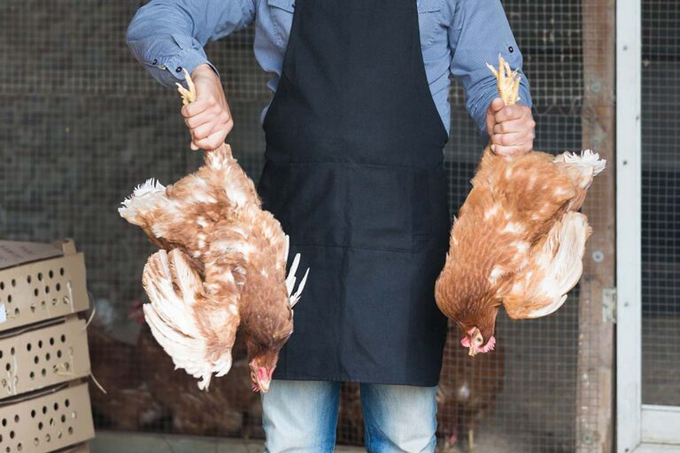June 8, 2025 | 19:54 GMT +7
June 8, 2025 | 19:54 GMT +7
Hotline: 0913.378.918
June 8, 2025 | 19:54 GMT +7
Hotline: 0913.378.918

In the Netherlands, Kipster calculated their additional cost of handling chickens upright by the abdomen - instead of by the legs - amounts to 0.0004 euro per egg. Photo: Canva
Claims that the UK would not relax animal welfare legislation post Brexit have been met with a barrage of criticism from welfare campaigners after it emerged that the government’s Animal Welfare Committee has suggested a proposal to legalise the carrying of chickens by their legs.
Currently an unlawful practice, although widely ignored, the Animal Welfare Committee has made the recommendation despite acknowledging it to be a “welfare compromise” that can cause “pain, discomfort and breathing difficulty”, leading to distress and injuries such as fractures and dislocation.
Under European Transport Regulation 1/2005, it is strictly forbidden to lift chickens by their legs on farms and during loading and unloading : “It shall be prohibited to… lift or drag the animals by head, ears, horns, legs, tail or fleece, or handle them in such a way as to cause them unnecessary pain or suffering.”
The Animal Welfare Committee proposal is for the European legislation to be amended for a period of 5 years so “it is legally permitted to lift chickens and turkeys weighing less than 10kg, by 2 legs”.
Campaigners say the legislation has been constantly ignored, leading to widespread animal suffering. Defra’s current Code of Practice for the Welfare of Meat Chickens and Meat Breeding Chickens (Broiler Code) and the Code of Practice for the Welfare of Laying Hens and Pullets (Laying Hen Code) allows leg-catching, in contravention of the law.
The row comes at a time comes less than a month after UK environment secretary Steve Barclay said: “We are committed to maintaining high animal welfare and food standards. Since leaving the EU we have put in place strong controls on imports, and we are using Brexit freedoms to strengthen welfare standards even further by banning the export of live animals for slaughter.”
The Animal Law Foundation has issued a pre-action letter to the Department of Environment, Food and Rural Affairs (Defra) setting out its legal case that the Code of Practice is currently endorsing illegal handling practices and needs to be changed. It and The Humane League UK are writing to the Animal Welfare Committee criticising the report.
Serena Conforti, Animal Law Foundation advocacy officer, said the Animal Welfare Committee’s recommendation was the first open suggestion of removing an EU animal welfare protection since the UK left the EU in 2020.
Cordelia Britton, The Humane League UK head of programmes, added: “Rather than encouraging farmers to give their chickens the small dignity of responsible handling when they are dragged off to slaughter, the Animal Welfare Committee has suggested legalising cruel leg-holding and slashing important standards which are already ignored. Chickens[…]deserve respectful treatment and should not be hauled around like objects.”
In the Netherlands, Kipster calculated their additional cost of handling chickens upright by the abdomen amounts to 0.0004 euro per egg. The Dutch government will be enforcing the standards for catching chickens upright by the abdomen from August after a successful judicial review.
(PW)

(VAN) With the war ongoing, many Ukrainian farmers and rural farming families face limited access to their land due to mines and lack the financial resources to purchase needed agricultural inputs.

(VAN) Vikas Rambal has quietly built a $5 billion business empire in manufacturing, property and solar, and catapulted onto the Rich List.

(VAN) Available cropland now at less than five percent, according to latest geospatial assessment from FAO and UNOSAT.

(VAN) Alt Carbon has raised $12 million in a seed round as it plans to scale its carbon dioxide removal work in the South Asian nation.

(VAN) Attempts to bring down the price of the Japanese staple have had little effect amid a cost-of-living crisis.

(VAN) Fourth most important food crop in peril as Latin America and Caribbean suffer from slow-onset climate disaster.

(VAN) Shifting market dynamics and the noise around new legislation has propelled Trouw Nutrition’s research around early life nutrition in poultry. Today, it continues to be a key area of research.